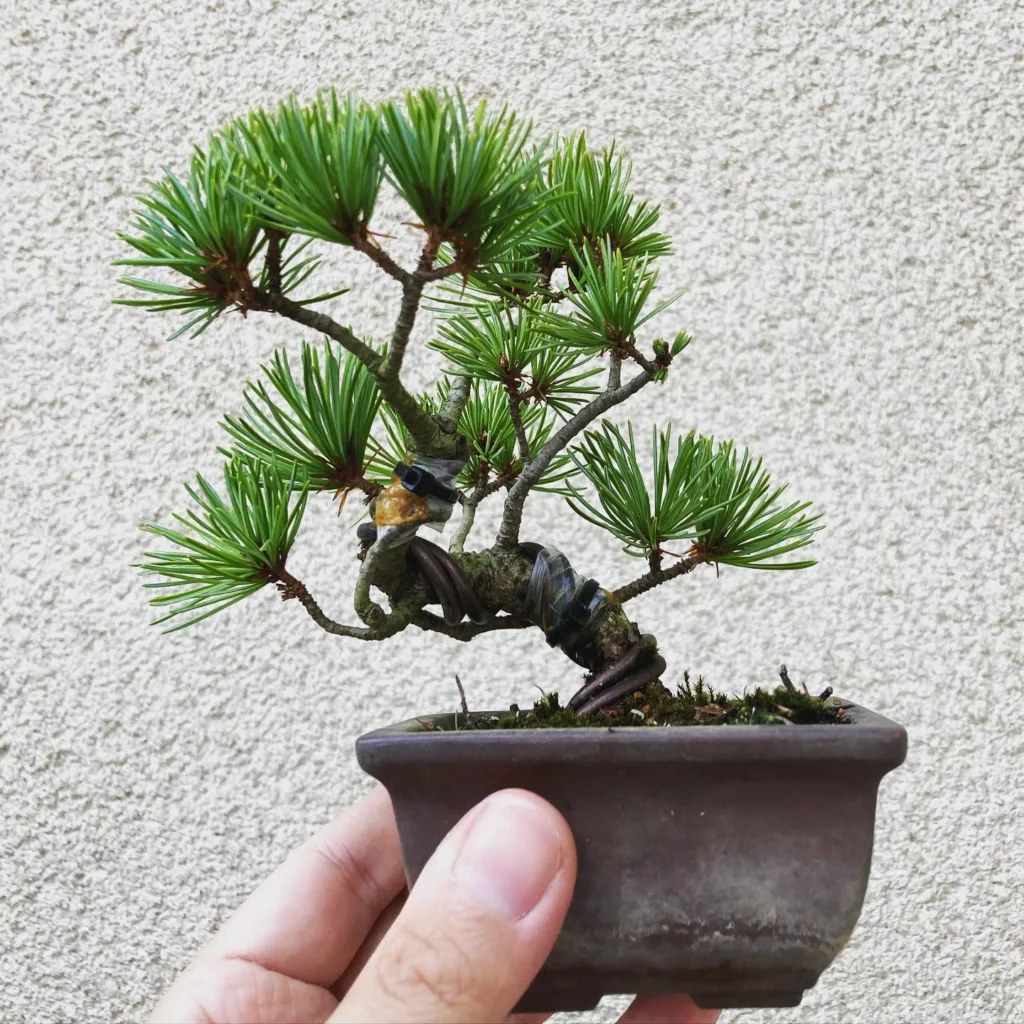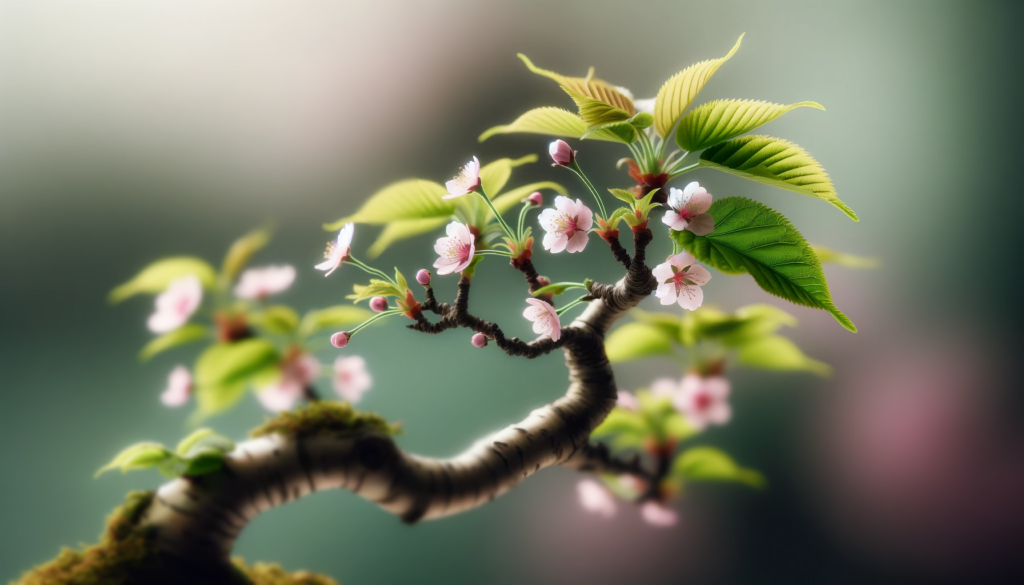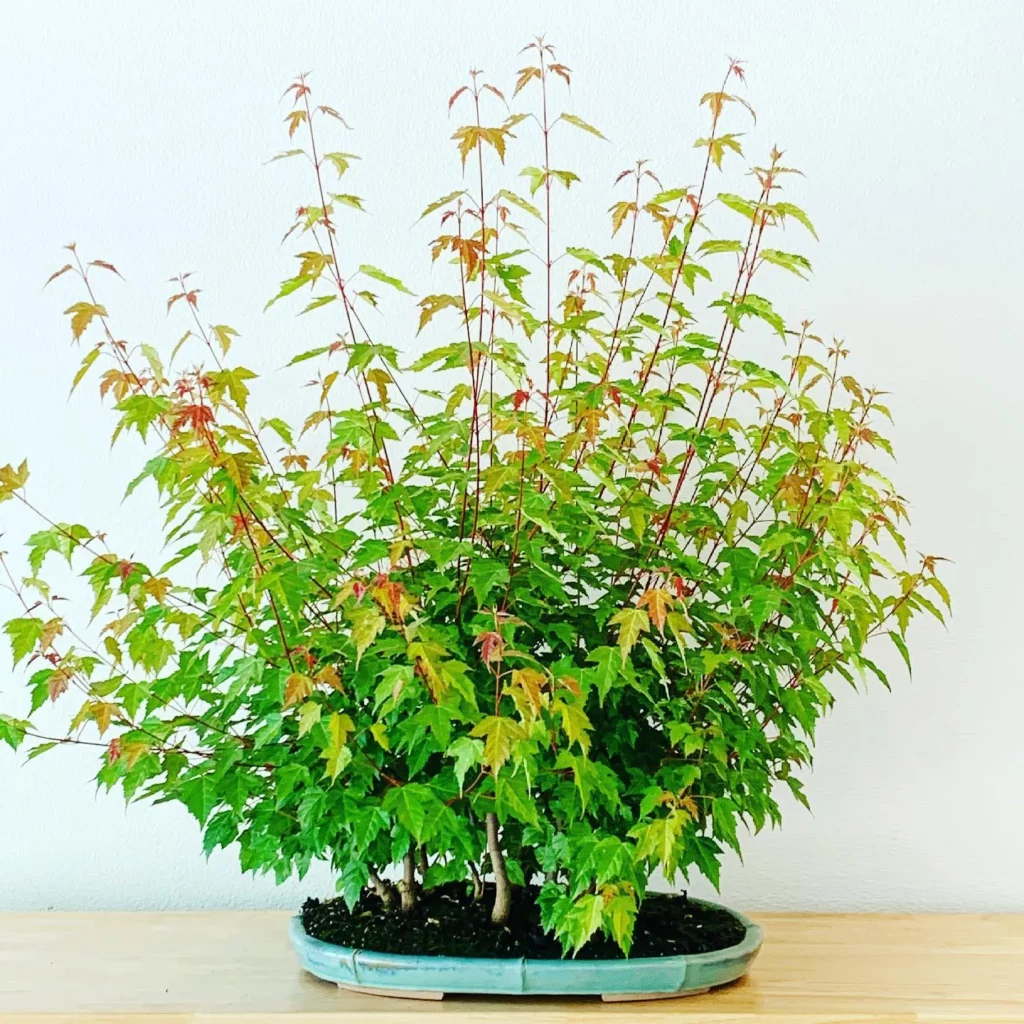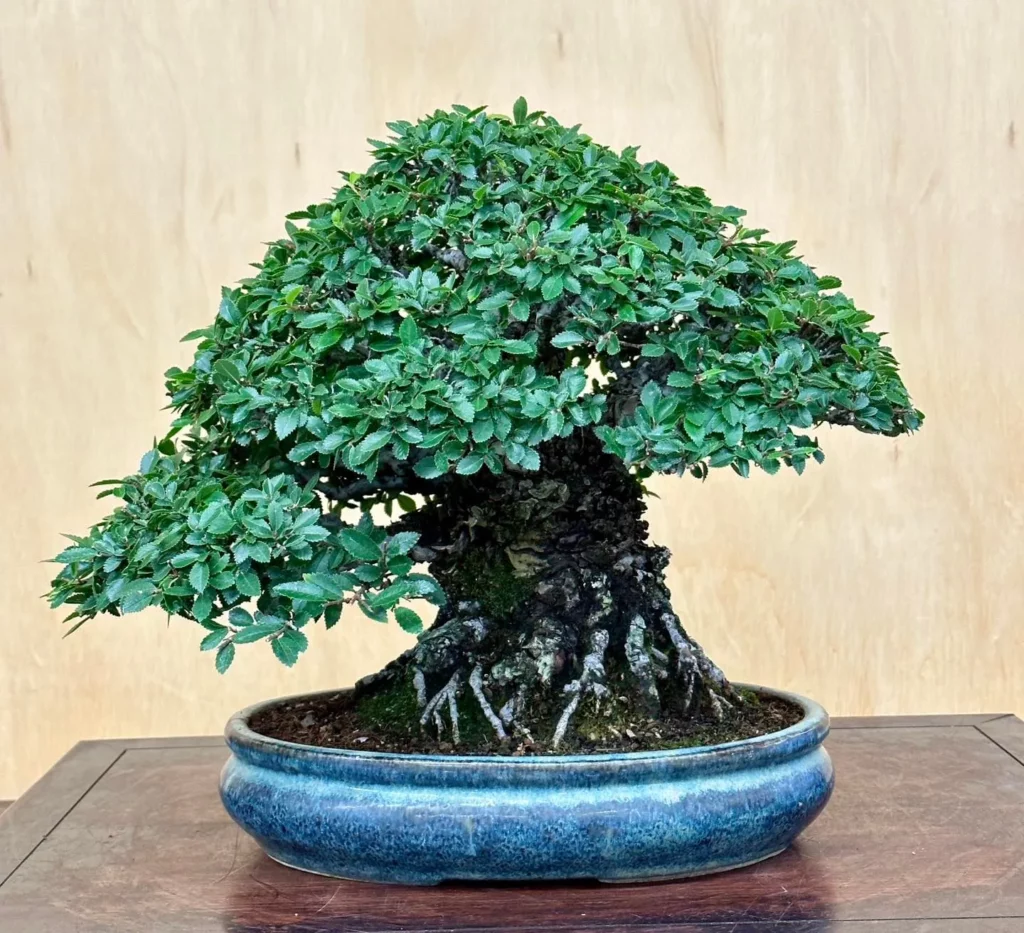Chinese Juniper Bonsai, specifically, carries a powerful symbol of tranquility and peacefulness. Its presence in your home or office can create a calm and soothing environment, promoting a sense of serenity. Not only that, but this bonsai tree is also believed to bring longevity and ward off negative energies, adding a touch of protective energy to your space.
The Significance of Bonsai Trees



Bonsai trees hold great significance and symbolize harmony, peace, and balance. Through their miniature form, they encapsulate the beauty and essence of nature. Each variety of bonsai represents different aspects of life and the natural world.
Chinese Juniper Bonsai, along with other species like Pine and Oak, embodies strength and resilience. This specific type of bonsai is believed to possess the power to ward off evil spirits, making it a revered symbol of protection and purification.
The Symbolism of Bonsai Trees
- Bonsai trees signify harmony and peace.
- They represent the beauty and balance found in nature.
- Chinese Juniper Bonsai symbolizes strength and resilience.
The Meaning of Chinese Juniper Bonsai



Chinese Juniper Bonsai is a coniferous evergreen tree that holds great meaning and symbolism. This beautiful bonsai variety represents harmony, peace, and longevity, making it a popular choice among bonsai enthusiasts. Placing a Chinese Juniper Bonsai in your home or office can create a serene and tranquil environment, fostering a sense of calmness and balance.
The symbolism of Chinese Juniper Bonsai extends beyond its appearance. This bonsai tree is believed to possess the power to ward off evil spirits, adding a layer of protection to its surroundings. Its long lifespan is associated with its ability to promote well-being and create a positive energy flow.
In addition to its symbolism, Chinese Juniper Bonsai also has practical uses in health and healing ceremonies. The tree’s berry-like cones contain beneficial properties that are utilized in various traditional practices. These cones are highly regarded for their healing attributes and are often incorporated into rituals aimed at promoting physical and spiritual well-being.
The Chinese Juniper Bonsai is not only a visually appealing addition to any space but also a powerful symbol of serenity, longevity, and positive energy. Whether you are a bonsai enthusiast or simply appreciate the beauty and symbolism of these miniature trees, the Chinese Juniper Bonsai is sure to bring a sense of peace and harmony to your surroundings.
Care Guide for Chinese Juniper Bonsai



Proper care is essential for the optimal growth of Chinese Juniper Bonsai. This unique bonsai tree features coniferous evergreen foliage, giving it a distinctive appearance.
Light Requirements
- Chinese Juniper Bonsai thrives in bright light conditions.
- However, it should be protected from excessive heat and direct sunlight to prevent scorching of the foliage.
Watering
- Moderate watering is recommended for Chinese Juniper Bonsai.
- Allow the soil to partially dry out between waterings to avoid overwatering, which can lead to root rot.
Fertilizing
- During the growing season, it is important to fertilize your Chinese Juniper Bonsai with a balanced bonsai fertilizer.
- Follow the manufacturer’s instructions for dosage and application frequency to ensure proper nourishment for your bonsai tree.
Potting
- Repotting every 2-3 years is necessary to provide fresh soil and promote healthy growth.
- Choose a well-draining potting mix specifically formulated for bonsai trees.
Propagation
- Chinese Juniper Bonsai can be propagated through cuttings.
- Take cuttings from healthy branches and follow proper propagation techniques for successful growth.
Growth and Development
- The growth and development of Chinese Juniper Bonsai require patience and regular pruning.
- Prune the tree to maintain its desired shape and promote healthy branching.
Pests and Diseases
- Monitor your Chinese Juniper Bonsai for common pests, such as spider mites.
- If pests or diseases are detected, take appropriate measures to treat and prevent further damage.
Symbolic Meanings of Other Bonsai Species



Different bonsai species carry their own symbolic meanings. Each variety of bonsai represents different aspects of nature and life, adding depth and significance to these miniature trees. Here are a few examples:
Ficus Bonsai
The Ficus Bonsai represents wisdom and longevity. This species has been revered for its ability to thrive and endure adverse conditions, symbolizing resilience and the accumulation of knowledge over time.
Chinese Elm
The Chinese Elm is often associated with growth and new beginnings. Its graceful branches and delicate leaves exemplify the potential for continuous development and the renewal of life’s cycles.
Japanese Black Pine
The Japanese Black Pine is a powerful symbol of strength and endurance. Its dark, rugged bark and sturdy branches convey resilience and the ability to weather challenges, making it an emblem of perseverance.
Chinese Sweet Plum
The Chinese Sweet Plum represents growth and new beginnings. Adorned with delicate flowers and attracting attention with its vibrant fruits, this bonsai species embodies the beauty and potential of fresh starts.
Cherry Blossom Bonsai
The Cherry Blossom Bonsai captivates with its ethereal beauty and serves as a powerful symbol of life’s transient nature. It represents the appreciation of beauty in the present moment and the celebration of new beginnings.
Maple Bonsai
The Maple Bonsai signifies grace, peace, strength, endurance, honor, and love. The elegant foliage and vibrant colors of the Maple tree evoke a sense of tranquility and harmony, fostering an atmosphere of grace and love.
The Origins of Bonsai



Bonsai, the art of cultivating miniature trees in containers, has a rich history that traces back to both China and Japan. It is a unique expression of art and nature, capturing the beauty and essence of trees in a reduced scale.
In ancient China, bonsai, known as “penjing” or “penzai,” which translates to “potted scenery” or “landscape,” was a practice reserved for the aristocracy. These meticulously maintained miniature landscapes symbolized prestige and were often used as decorative elements in formal gardens.
Japanese Buddhist monks and diplomats were introduced to penjing during their visits to China. Fascinated by the art form, they brought it back to Japan. However, the Japanese artisans adapted and transformed penjing to suit their aesthetic sensibilities and minimalist philosophy.
During the Kamakura period in Japan (1185-1333), Zen Buddhist monks played a significant role in refining the art of bonsai. They sought to capture the essence of nature and create a contemplative connection with the natural world. The result was a simpler, more austere style of bonsai, focusing on the tree’s form and elegance.
Over time, bonsai became more accessible to the general population and evolved into an art form that carried profound symbolic and sacred significance. It embodies the beauty, resilience, and wisdom of nature, inspiring contemplation, harmony, and tranquility.
The origins of bonsai in China and its subsequent refinement in Japan have endowed this art form with a rich cultural heritage and a deep symbolic meaning that continues to captivate enthusiasts and nature lovers around the world.
Bringing Bonsai into Your Life



Bonsai trees have the power to bring meaning and tranquility into your life. By understanding the symbolism and significance of different bonsai species, you can choose a tree that aligns with your values and aspirations.
Introducing bonsai into your home or office can create a harmonious and balanced environment. The presence of these miniature trees promotes a sense of calm and tranquility in your surroundings. They serve as natural reminders to slow down, appreciate the present moment, and find beauty in simplicity.
Caring for a bonsai tree also offers valuable life lessons. It teaches patience as you meticulously tend to its needs, nurturing the growth of both the tree and yourself. The mindfulness required in the care of bonsai allows you to connect with nature on a deeper level and find solace in the art of cultivation.
Bringing the Meaning of Bonsai to Life:
- Balance: Bonsai encourages balance in your life by reminding you to find harmony between work, leisure, and personal well-being.
- Harmony: The presence of bonsai promotes a sense of harmony and tranquility in your surroundings, allowing you to create a serene atmosphere.
- Connection to Nature: Bonsai brings nature indoors, allowing you to experience the beauty and tranquility of nature even in the confines of your home or office.
- Mindfulness: The care of a bonsai tree requires mindfulness and attentiveness, enabling you to cultivate a sense of presence and focus in your daily life.
- Personal Growth: Nurturing a bonsai tree fosters personal growth as you learn the art of patience, discipline, and dedication.
The Metaphysical Properties of Bonsai Trees



Bonsai trees possess remarkable metaphysical properties that make them more than just ornamental plants. These miniature trees have a magical essence that goes beyond their physical appearance. Here are some of the unique metaphysical properties that bonsai trees offer:
- Purification: Bonsai trees have the natural ability to purify the air around them. They filter out toxins and release fresh oxygen, creating a clean and revitalized environment.
- Healing Energy: The presence of bonsai trees can promote healing and well-being. They emit positive vibrations that can soothe and uplift the mind, body, and spirit.
- Stress Relief: Bonsai trees have a calming effect on our emotions. By nurturing and connecting with these living beings, we can experience a sense of tranquility and inner peace.
- Connection with Nature: Bonsai trees serve as a reminder of our connection to the natural world. They bring the essence of nature into our homes and workplaces, fostering a deeper appreciation for the beauty and harmony of the Earth.
Choosing and Buying a Bonsai Tree
When it comes to choosing and buying a bonsai tree, there are a few key considerations to keep in mind. First and foremost, think about the metaphysical properties and symbolism that resonate with you. Bonsai trees are known for their deep meaning and can bring a sense of harmony and balance to your space.
1. Connect with the energy: Take the time to connect with the energy of the bonsai tree you are considering. Tune in to how it makes you feel and whether it aligns with your intentions and desires. Trust your intuition and choose a tree that speaks to you on a deeper level.
2. Consider your space: Bonsai trees come in various sizes and styles, so it’s important to consider the available space in your home or office. Choose a tree that fits well and complements your surroundings. Remember that bonsai trees require proper care, including regular pruning and watering, so make sure you have the time and dedication to maintain its health.
3. Sources for buying: There are several options for buying bonsai trees. You can explore local nurseries and garden centers, where you can see the trees in person and get expert advice. Additionally, there are numerous reputable online sellers who offer a wide selection of bonsai trees for purchase. Research the sellers and read reviews to ensure you are buying from a trustworthy source.
4. Check for health: Before making your purchase, carefully inspect the bonsai tree to ensure it is in good health. Look for vibrant foliage, strong branches, and a well-maintained root system. Avoid trees with signs of disease or neglect, such as yellowing leaves or damaged branches.
5. Seek guidance: If you’re new to bonsai, it can be helpful to seek guidance from experts or experienced bonsai enthusiasts. They can provide valuable insights on choosing the right tree for your needs and offer tips on care and maintenance.
Embracing the Symbolism of Bonsai Trees
By embracing the symbolism of bonsai trees, you have the opportunity to establish a deep connection with nature and foster a sense of balance and harmony in your daily life. Bonsai, with its rich history and tradition, represents the wisdom and resilience of nature, serving as a constant reminder to live in the present moment.
As you care for your bonsai tree, paying attention to its unique needs and nurturing its growth, you are also tending to your own well-being. The act of tending to a bonsai tree can be a meditative and calming experience, providing a moment of respite from the hustle and bustle of daily life.
Bonsai trees hold a special place in many cultures, symbolizing patience, endurance, and the delicate balance between man and nature. Their presence in your home or workspace can bring a touch of serenity and natural beauty. Whether you choose a Chinese Juniper Bonsai or another species, the symbolism and beauty of bonsai trees make them a meaningful addition to any space.
FAQ
What is the symbolism of Chinese Juniper Bonsai?
Chinese Juniper Bonsai symbolizes harmony, peace, and longevity. It inspires tranquility and promotes a calm and balanced environment.
What care does Chinese Juniper Bonsai require?
Chinese Juniper Bonsai requires proper care for its optimal growth. It requires bright light but should be protected from excessive heat and direct sunlight. Watering should be done moderately, allowing the soil to partially dry between waterings. Fertilizing should be done during the growing season with a balanced bonsai fertilizer. Repotting is necessary every 2-3 years to provide fresh soil and promote healthy growth. Propagation can be done through cuttings. The growth and development of the bonsai tree require patience and regular pruning. Pests and diseases such as spider mites and root rot should be monitored and treated accordingly.
What do other bonsai species symbolize?
Different bonsai species carry their own symbolic meanings. Ficus Bonsai represents wisdom and longevity, while Chinese Elm, Japanese Black Pine, and Chinese Sweet Plum symbolize growth and new beginnings. Cherry Blossom Bonsai represents the beauty of life and new beginnings. Maple Bonsai signifies grace, peace, strength, endurance, honor, and love. Each bonsai species has its unique symbolism and significance.
How did bonsai originate?
Bonsai originated in China and was known as “penjing” or “penzai,” which means “potted scenery” or “landscape.” It was reserved for the upper class and symbolized prestige. Japanese Buddhist monks and diplomats brought penjing to Japan, where it was adapted and transformed into a more minimalist style by Zen Buddhist monks. Bonsai became accessible to everyone and gained profound symbolic and sacred significance.
What are the metaphysical properties of bonsai trees?
Bonsai trees have inherent magical and healing properties. They purify the air, release oxygen, and contribute to the overall well-being of their surroundings. The energy and properties of bonsai can be harnessed through nurturing and keeping them in your home or workplace. Each bonsai species has its unique benefits that can positively impact your life and environment.
How do I choose and buy a bonsai tree?
When choosing and buying a bonsai tree, it’s important to consider the metaphysical properties and symbolism that resonate with you. Take time to connect with the energy of the tree and see how it aligns with your intentions and desires. There are various sources where you can buy bonsai trees, both online and in physical stores. Choose a reputable seller and ensure the tree is well-cared for and healthy.
How can embracing the symbolism of bonsai trees benefit my life?
By embracing the symbolism of bonsai trees, you can create a deeper connection with nature and cultivate a sense of balance and harmony in your life. Bonsai represents the wisdom and resilience of nature and serves as a reminder to live in the present moment. As you care for your bonsai tree, you nurture not only the tree but also your own well-being. Bonsai trees are a beautiful and meaningful addition to any space.




